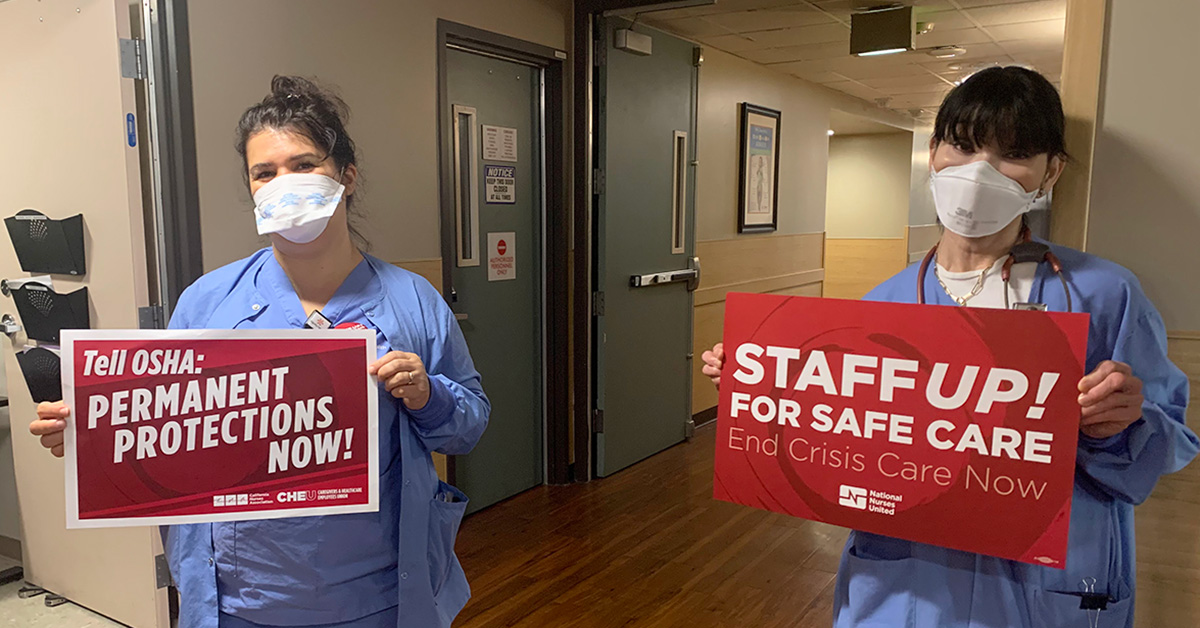Nurses continue fight for OSHA permanent standard on Covid

By Chuleenan Svetvilas
National Nurse Magazine - January | February | March 2022 Issue
Since the beginning of the pandemic, National Nurses United has been fiercely advocating for mandatory protections to protect nurses and other health care workers and, as we marked two years into Covid this spring, we relentlessly continue our fight.
On Mar. 4, 2020, NNU filed a petition with the Department of Labor’s Occupational Safety and Health Administration (OSHA) seeking an emergency temporary standard (ETS) to protect nurses and other health care workers from occupational exposure to Covid-19. Less than three weeks later, NNU sent a petition to Congress with a quarter of a million signatures demanding that Congress ensure that nurses and health care workers are immediately given the protections they need to avoid exposure to Covid.
More than a year later, on June 21, 2021, OSHA issued the Healthcare Emergency Temporary Standard on Occupational Exposure to Covid-19. In early December, NNU urged OSHA to adopt a permanent standard. On Dec. 16, NNU, along with more than 40 unions and other organizations as well as more than 6,300 individuals, signed and delivered a petition to OSHA, urging the agency to adopt a permanent standard. However, by Dec. 21, OSHA had still failed to adopt a permanent standard on Covid-19 in health care workplaces.
“It is unconscionable that OSHA would not issue a permanent Covid-19 health care standard to protect nurses and other health care workers,” said NNU Executive Director Bonnie Castillo, RN. “Without an eventual permanent standard, we will see more transmission of the virus, more hospitalizations, and more deaths from Covid-19.”
NNU and other leading labor organizations filed an emergency petition on Jan. 5, 2022, with the U.S. Court of Appeals for the District of Columbia to order OSHA to issue a permanent standard and retain the existing ETS, as required by law, until the permanent standard goes into effect. The petitioners include NNU; AFL-CIO; American Federation of Teachers (AFT); American Federation of State, County, and Municipal Employees (AFSCME); New York State Nurses Association (NYSNA); and Pennsylvania Association of Staff Nurses and Allied Professionals (PASNAP).
The unions petitioned the federal appellate court to issue a writ of mandamus ordering OSHA to issue a permanent standard for health care occupational exposure to Covid-19 “aimed at protecting the life and health of millions of nurses and other frontline health care workers throughout the United States in grave danger from the deadly Covid-19 pandemic,” and retain and enforce the June 21 ETS until it is properly superseded by the permanent standard.
Later in January, 115 members of Congress, led by Rep. Debbie Dingell, sent a letter to President Joe Biden urging the administration to quickly issue a final permanent Covid-19 OSHA standard for health care workers and to retain the emergency temporary standard until the permanent standard takes effect. Additionally, 21 U.S. senators, led by Sen. Kirsten Gillibrand, sent a letter to President Biden and U.S. Secretary of Labor Marty Walsh urging the administration to quickly issue a final permanent Covid-19 OSHA standard for health care workers.
The Covid-19 pandemic is far from over, as cases spike in Europe and Asia and public health experts brace for a potential new surge arising from the BA.2 subvariant, waning immunity, and almost complete abandonment of public health infection control protections. By the end of March 2022, nearly 500 registered nurses and more than 4,500 other health care workers had died due to Covid-19.
NNU Legal Director Nicole Daro argued the case before the appellate court in early April, stating, “OSHA knows that the impact of this pandemic has been borne disproportionately by the health care workers tasked with caring for those infected by this disease...Yet OSHA has left these very workers without necessary protections, despite a clear statutory mandate to protect workers in precisely this situation.”
Chuleenan Svetvilas is a communications specialist at National Nurses United.